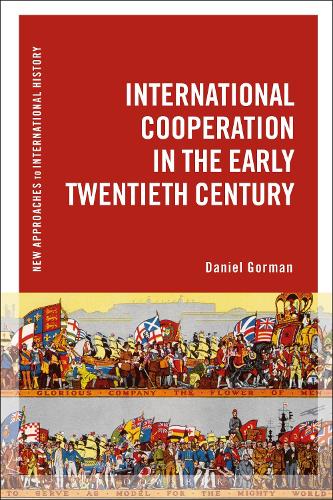
International Cooperation in the Early Twentieth Century
(Hardback)
Available Formats
Publishing Details
International Cooperation in the Early Twentieth Century
By (Author) Daniel Gorman
Bloomsbury Publishing PLC
Bloomsbury Academic
21st September 2017
United Kingdom
Classifications
Professional and Scholarly
Non Fiction
International relations
Diplomacy
History and Archaeology
327.0904
Physical Properties
Hardback
352
Width 156mm, Height 234mm
671g
Description
The early 20th-century world experienced a growth in international cooperation. Yet the dominant historical view of the period has long been one of national, military, and social divisions rather than connections. International Cooperation in the Early Twentieth Century revises this historical consensus by providing a more focused and detailed analysis of the many ways in which people interacted with each other across borders in the early decades of the 20th century. It devotes particular attention to private and non-governmental actors. Daniel Gorman focuses on international cooperation, international social movements, various forms of cultural internationalism, imperial and anti-imperial internationalism, and the growth of cosmopolitan ideas. The book incorporates a non-Western focus alongside the transatlantic core of early 20th-century internationalism. It interweaves analyses of international anti-colonial networks, ideas emanating from non-Western sites of influence such as Japan, China and Turkey, the emergence of networks of international indigenous peoples in resistance to a state-centric international system, and diaspora and transnational ethno-cultural-religious identity networks.
Reviews
Gormans book is packed with useful information about different types of nonstate- based international cooperation ... For students and academics looking for a clear and concise introduction to the historical origins of todays networked international society, this is the book to read. It is especially good at highlighting the role of private initiative and progressive social causes. * European History Quarterly *
Historian Gorman (Univ. of Waterloo, Canada) avoids traditional diplomatic historical approaches to the background of imperial rivalries and the events leading to WWI in favor of analyzing the efforts to promote international cooperation in the years before, during, and after the Great War This study is a good starting point for an understanding of greater global cooperation. Summing Up: Recommended. Upper-division undergraduates and above. * CHOICE *
Daniel Gorman is to be congratulated on writing an impressively wide-ranging and thought-provoking synthetic account of international cooperation in the early twentieth century Overall, Gormans book dexterously explores many international organizations and networks ranging from the International Federation of National Standards Association to international trade unionism, while never descending into a laundry list of acronyms. * H-Diplo *
This is an ambitious, imaginative, and far-reaching synthesis of the international sphere. It presents an almost encyclopedic tour of the globe while persuasively contending that the world was far more deeply connected than ordinarily thought. The analytical connections formed herein should stimulate many new lines of inquiry. * Branden Little, Associate Professor of History, Weber State University, USA *
This is a timely, necessary and original volume in which Daniel Gorman captures the multi-faceted and interrelated aspects of early twentieth-century cooperation. In a straightforward and accessible style, this book breaks with the traditional chronological caesuras, as well as units and levels of analysis and will be extremely useful for undergrads and specialists alike. * Davide Rodogno, Professor of International History, The Graduate Institute Geneva, Switzerland *
Author Bio
Daniel Gorman is Professor in the Department of History at the University of Waterloo, Canada, and teaches at the Balsillie School of International Affairs, Canada. He is author of The Emergence of International Society in the 1920s (2012) and Imperial Citizenship: Empire and the Question of Belonging (2007).
